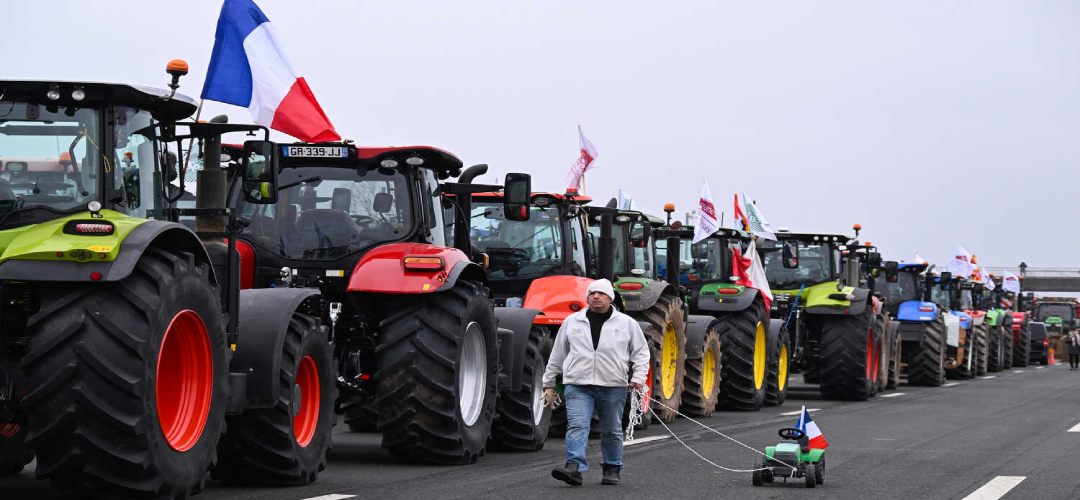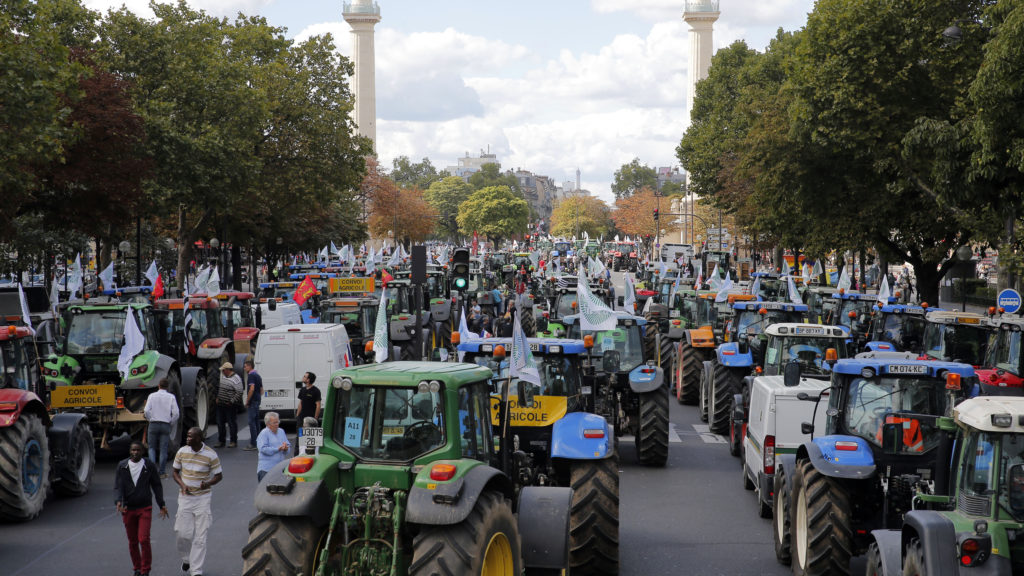Paris: Keeping the Tractors at Bay?
February 4, 2024 | Expert Insights

In a country where farmers hold traditional importance, popular support, and political influence, scores of angry farmers are an issue to reckon with.
French farmers have blocked key highways to Paris and are moving encircle the capital as they persist with the protest movement over a range of grievances. Their major concerns include competition from cheaper imports, environmental regulations, and low pay as they grapple with hiked up costs. President Emmanuel Macron’s new right-tinted government has come up against its first roadblock and is scrambling to pacify the furious farmers.
Background
Grievances have been brewing in France, the biggest agricultural producer in the European Union (EU) where farmers continue to struggle to compete in an increasingly globalized economy.
Economic shocks from the Ukraine war like higher costs and fuel prices have brought matters to a head. Energy costs surged since the war, affecting farmers using tractors, harvesters, and other fuel-based equipment. Prices also shot up for farming inputs, notably fertilizers. Grain and other agricultural imports from Ukraine have flooded European markets; the EU has waived quotas and duties since Russia’s invasion. Imports pressure European prices and often don’t have to meet the environmental standards that EU farmers are subject to.
EU environmental regulations and France’s implementation of it are a major point of contention. A government plan to phase out a tax break for farmers on diesel fuel as a part of the energy transition has irked farmers.
While the movement is not as sweeping as the yellow vest movement that took over the country in 2018-2019, the government is understandably wary of it and is offering further concessions after the first round did not stem the protests.

Analysis
Agriculture has long been a cornerstone of French culture and tradition and farmer lobbies exercise considerable influence. France’s farming sector received the largest single share of the EU agricultural budget last year, designed to support livelihoods and production and stabilise food prices. However, E.U. regulations have come under fire from farmers such as a new rule to preserve biodiversity that requires larger farms to leave 4 per cent of arable land fallow to receive critical farming subsidies.
Additionally, farmers complain that France allows too much food to be imported from countries like Brazil and New Zealand, which do not follow as stringent environmental practices and have cheaper production costs. An EU free trade deal with South American bloc Mercosur has also riled up farmers.
The protest in the EU’s leading agricultural nation is significant, adding to other farmer protests in Europe such as in the Netherlands, Belgium, Spain, Romania, and recently Germany where protests erupted after a government decision to cut diesel subsidies for farm vehicles.
Many farmers resent taking on the financial burden of pollution in the aftermath of an energy crisis and a pandemic: increasingly costly fertilizer, fuel, energy, and pesticides have driven up their costs.
While climate change impacts threaten crop yields, agricultural habitats, and water supplies, some European governments are more concerned by the pressing threat presented by dissatisfied farmers who are attracting attention from far-right and populist parties. For instance, in Germany, the protests have gained support from the far-right Alternative for Germany (AfD) and groups with more extreme and anti-democratic views.
The Macron government is treading carefully and looking for concessions such as a waiver on the fallow land rule and measures to prevent imports from Ukraine like sugar, poultry and eggs that are destabilizing markets. This marks a shift; Paris had earlier opposed moves by eastern EU countries to curb incoming Ukrainian produce.
Adding to the pressure on the government are the upcoming EU elections this year and the fact that farmers enjoy vast public support in France.
The protests could add to a rightward shift in the European Parliament with the EU's green agenda under pressure. Far-right groups across the continent are looking to make it a Europe-wide conflict and bolster the support they have won over increasingly resented Ukrainian imports. Farmers’ votes are also seen as a way to reach rural support in general.
Assessment
- Macron’s government continues to come up with concessions and has also reached out to the EU with proposed changes in favour of the farmers’ claims. Macron is keen to avoid a protest like the yellow vest movement, which dented his popularity and proved a major challenge.
- His government is also keen to not lose out to far-right parties who vocally oppose Ukrainian imports and free trade deals such as the Mercosur deal as well as climate protection measures.
- The EU will have to take measures towards addressing farmer grievances not just because of pressure from its member governments but also so that it can maintain farmer support.








Comments